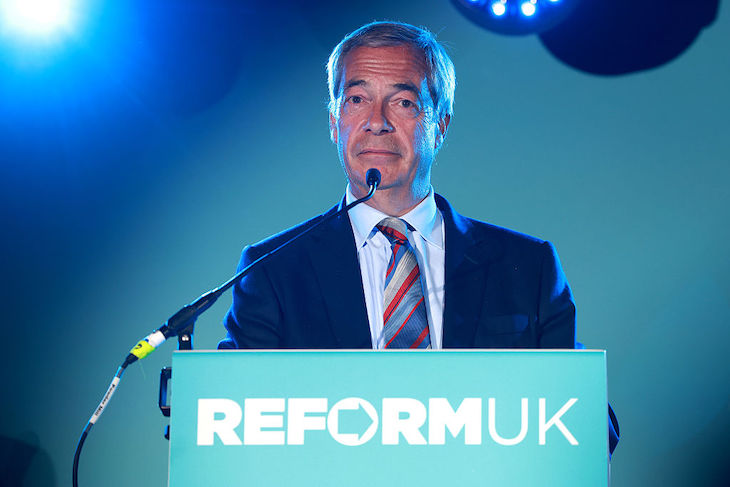If the problem with Labour is that it believes in nothing, the problem with Reform is that it believes in everything. The dispute over the burqa is only the latest example.
Few things unite supporters of Reform like opposition to benefits for anyone other than themselves
In pushing Keir Starmer to ban the burqa ‘in the interests of public safety’, new MP Sarah Pochin undoubtedly spoke for a significant section of the party’s supporters. For that matter, polling has previously indicated the British public’s backing for a ban.
For some, it is indeed a safety issue: presented with a stranger, covered head-to-foot, identifiable only by their eyes, how can we know who that person is, whether they ought to be there, and what their intentions are?
For others, it’s a symbol of the cultural separatism that sees entire communities of Muslims live parallel lives in Britain, indifferent or hostile to our inherited customs and conventions. Then there are the feminists — not liberal feminists, actual feminists — who say the garment is misogynistic and echoes Islam’s broader contempt for women.
But in calling Pochin’s question ‘dumb’ and subsequently quitting as chairman, Zia Yusuf will also have spoken for some Reform voters and many more in the electorate.
For these people, the issue isn’t safety but liberty: what business is it of the state how a person dresses provided they are wearing clothes and acquired them lawfully? The sovereignty of the individual is intrinsic to the British tradition of freedom.
For others, this is specifically a question of religious liberty. This is no longer a country in which a person must display or refrain from displaying their religious loyalties. Muslim women should no more be prevented from veiling their faces than traditionalist Catholic women should be from donning a mantilla. Besides, even if the burqa is a device of modesty and repression, what’s wrong with either of those? Nationalists and assimilationists might see burqa bans as a means of creating a hostile environment for Muslims, but post-liberals and virtue ethicists would say that self-denial, piety, and humility are moral goods and their practice contributes to the living of a righteous and well-ordered life.
This goes to a question that no one — not Nigel Farage, nor his voters, nor his opponents, nor the political scientists — seems able to answer: Is Reform a right-wing party and, if so, what kind of right-wing is it? Is it just a zombie-Thatcherite party (‘Must… cut… more… taxes…’) or does it break with market liberalism in favour of the common good and the moral order?
Another illustration of this tension between boomer Toryism and zoomer futurism is the question of family benefits, and in particular the two-child cap. This time Farage is on the zoomer side: last month he called for an end to the cap, which has been identified as one of the causes of an increase in child poverty. It was a brave call for a populist considering that 60 per cent of voters back the cap, but especially for Farage since that figure rises to 84 per cent among Reform voters.
Few things unite supporters of Reform like opposition to benefits for anyone other than themselves. While the removal of the Winter Fuel Allowance was cruel and callous penny-pinching, the two-child cap is, if anything, far too generous. Lazy, feckless people should stop expecting others to pay for their children or just stop having children altogether.
It is no coincidence that the age group most in favour of the cap is the over-65s and the least in favour those aged 18 to 24. The post-war baby boom came about in part because an expansive state created circumstances favourable to procreation. Then the baby boomers voted to shrink the state for subsequent generations and, for good measure, to hoard property and oppose development, making it all the harder for their children and grandchildren to start a family. Even as the depressive effects of these decisions on natality shift the burden of state pensions and social care onto a dwindling supply of young workers, boomers insist on denying additional social security to families who have above-replacement levels of children.
The young workers who find themselves shouldering the financial and societal consequences created by an entitled generation are, unsurprisingly, more sympathetic to loosening the Treasury’s miserly grip on the public finances. They think the state should be subsidising larger families, and while this might be because they are generally prone to welfarist attitudes or consider the two-child cap unfair on more fecund ethnic minorities, it is amusing to watch the children of the Sixties turn sour on free love while their grandchildren long for nothing more than settling down, buying a house and starting a family. Every revolution is the midwife of a counter-revolution.
Reform relies heavily on boomer votes and so Farage’s stand against the two-child cap is another test of what kind of right-wing the party represents. Pro-family or pro asset-hoarding? For wealth creation and innovation, or the orderly management of Britain’s decline?
I said at the outset that believing in everything was the problem with Reform, but is it necessarily a problem for Reform? A big-tent party (think New Labour or the current SNP) can contain competing and even contradictory ideologies and policy platforms. We might call this Kang and Kodos centrism, after the alien duo from The Simpsons who plot to take over the United States by impersonating Bob Dole and running on a broad-based platform of ‘abortions for some, miniature American flags for others’. Can Reform adopt a similar strategy – ‘child benefits for some, burqa bans for others’ – that is capable of taking them into Number 10? And, if they can, will they be able to maintain it in government, or will fiscal and policy dilemmas force them to choose?








Comments